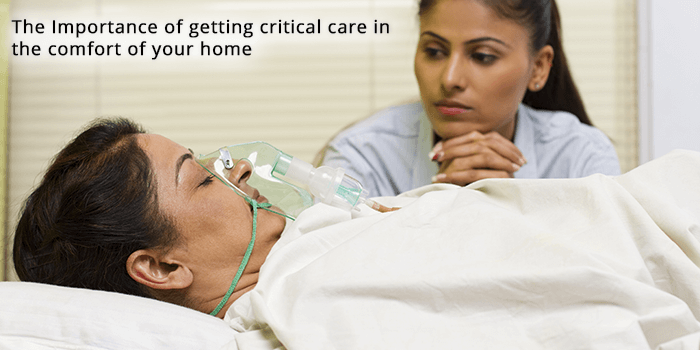Is there a need for home healthcare in India?
There are many reasons - rational, emotional and medical - for moving patients out of hospital ICUs and providing them with critical care at home. Generally, these are patients who still need ICU facilities and critical care treatment but don’t need to receive this care in hospital. Long stays in the ICU are not only more expensive but potentially increases the risk of acquiring nosocomial infections that delay the start of rehabilitative treatments.
Opting for critical care at home has several advantages, including:
- An environment with reduced noise and night-time light, helping the patient to return to more circadian rhythms and better sleep patterns
- Allows unrestricted visits by relatives and friends
- Enables convenient access to personal belongings, such as books, computers, tablets, TV, music players, etc.
- Continuing intensive care at home is a more cost-effective and affordable alternative to the hospital ICU. ICU treatment in a hospital results in high medical costs while the treatment itself isolates patients from their families
- Enables better management of the patient’s needs
Critical care at home provides patients with 24x7 intensive care
Patients requiring highly specialized intensive care need high-end infrastructure support and continuous medical attention. Most nursing and medical services providing health care at home bridge this gap by providing the patient and his/her caregivers with:
- Cost effective treatment that give excellent clinical results
- Healthcare at par with hospitals without the problems of additional expense and time spent on numerous hospital visits.
- Quicker patient recovery
Plus, living and recovering in a familiar environment has many psychological benefits including feelings of security and emotional support.
The “whys” of providing quality critical care at home
Critical care at home offers what can best be summed up as professional protocol led healthcare. Highly qualified and experienced medical professionals, supported by skilled and experienced nursing attendants, visit daily to ensure quality care at home, carried out with a strict adherence to universally approved protocols.
Individualized patient care is provided under stringent doctor supervision. The patient's personal doctor controls critical care treatment guided by a customized care plan. Progress is monitored through daily reports, which are created as clinical data, accessible on handheld digital devices.
Comfort and convenience for the patient and the caregiving family. Aside from the reports sent to doctors for consultation, the patient and his/her family have access to regular patient health reports, disease counselling and patient education to keep them and the caregivers informed and involved in the patient’s progress.
Some components of critical care at home
Generally, for patients recovering at home from serious surgery, injury or illness, the following elements of clinical treatment and nursing are offered: Bed sore care, critical care nutrition, fluid management, parenteral feeding, Stoma care, DVY Prophylaxis, wound care, care of IV lines, enteral feeding, infusions, physiotherapy, Tracheostomy and Ventilator care. In addition, ICU infrastructure and equipment are also part of the care package.
To sum up…
The benefits of opting for critical care at home are many – both for the doctor and the patient.
Benefits for the doctor: Faster recovery of patients due to better treatment compliance; less chance of secondary infections; improved patient satisfaction due to better clinical outcomes; reduced length of stay thus improving efficiency and throughput
Benefits for the patient: Faster recovery due to the comfort of being at home; better compliance; significant cost saving as professional home health care is 60-70% less expensive than hospitals; smoother transition from hospital - ensures faster rehabilitation into normal life.




